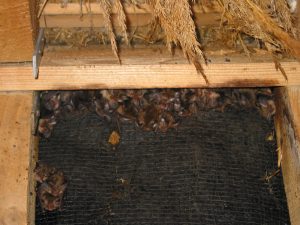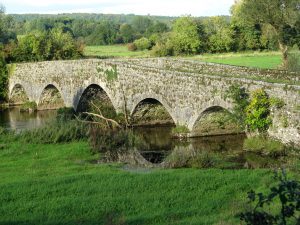For many people, their first contact with bats is finding their rather mouse-like droppings in the attic, or less often, finding a lost bat circling the living room or clinging to the curtains.
Bats rely heavily on buildings for roosting and to a large extent, their conservation depends on tolerance and goodwill from their human hosts. Average maternity colony sizes are about 50 bats although most roosts are much smaller. Larger roosts are not uncommon among particular species. A maternity or nursery roost is where females gather to give birth in the summer. Bats typically roost in buildings during the summer months, leaving in autumn to seek a site with a more stable temperature regime for hibernation.
Many Irish bats roost in trees from time to time. The species that is most often found in trees is the Leisler’s bat, 13% of all recorded roosts of this species in Ireland have been located in trees. All other species have been found roosting in trees at least from time to time. Some species, such as the whiskered bat, appear to have a network of roosts within an area that they may use in different weather or temperature conditions. The roosts in the network may include buildings and trees, depending on the species.
Some bats prefer to roost in the attic spaces of occupied dwellings, although churches, ruined buildings or disused out-buildings can also be used. Sometimes bats roost by hanging from the roof or nestled between roof timbers, although they can also roost in walls, in crevices between stonework or behind soffit and fascia boards. In ruined buildings, stonework crevices, basements, or even chimneys can be used as roost sites. The Daubenton’s bat, in particular, favours roosting in the crevices of stone bridges.



